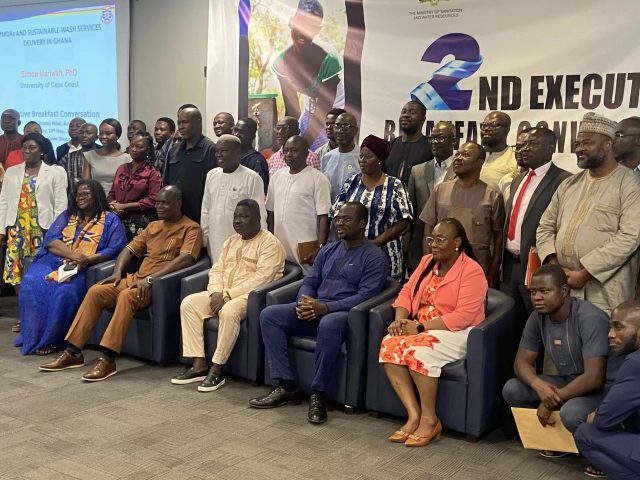By: Franklin ASARE-DONKOH
Stakeholders in the Water, Sanitation and Hygiene (WASH) sector have called on local authorities to prioritize access to safe drinking water, sanitation, and hygiene services in schools and health facilities across the country.
Data available shows that most schools and health care facilities do not have access to water and sanitation facilities.
It’s based on this data that the captains in the sector are calling on leadership and managers of the various Metropolitan, Municipal, and District Assemblies (MMDAs) to allocate more resources to further improve upon the existing systems.
The stakeholders made the call at the 2nd Executive Breakfast Conversation organized by the World Vision International (WVI) Ghana in partnership with the Ministry of Sanitation and Water Resources (MSWR) at the Fiesta Royal Hotel, Accra.
Addressing the gathering, the National Director of World Vision Ghana, Mr. Dickson Thunde, underscored the need to strengthen MMDAs to help Ghana achieve sustainable WASH services under the Sustainable Development Goals (SDGs).
According to him, the local government administrations hold the mandate by law to plan, implement, and deliver development interventions, including WASH services, within their jurisdictions which includes educational and healthcare facilities.
‘No development strategy can ignore the vital requirements of citizens in respect of safe drinking water and improved sanitation services,’ Mr. Thunde stated.
The executive breakfast conservation series sought to provide the platform for stakeholders and industry players to discuss the steps needed to bridge the gaps in service delivery and meet the Sustainable Development Goals (SDGs) targets for the sector.
Meanwhile, the Deputy Minister for Sanitation and Water Resources, Mr. Amidu Issahaku Chinnia, speaking during a day’s multi-stakeholder discussion which was on the theme: “Metropolitan, Municipal and District Assemblies (MMDAs) and Sustainable WASH Services Delivery” said his ministry is engaged with other ministries to ensure that the issue of lack of WASH facilities in schools and health care institutions are addressed.
‘It is regrettable that many schools and health care facilities lack access to basic WASH services,’ the Deputy Minister said
He hinted that the government is focus on WASH access in schools and health facilities was to create a conducive and healthy environment in these institutions and promote general wellbeing among Ghanaians.
This, Mr. Chinnia believes, is a holistic approach to health and well-being by ensuring the availability of safe and sustainable WASH services in critical institutions and among vulnerable groups.’
He added, ‘From now on, any school facility we are developing must have WASH facilities to ensure access to safe and sustainable WASH services in schools.’
The deputy minister announced that the Ministry of Sanitation and Water Resources had already consulted with the Ministry of Education, Ghana Education Service, and the Ghana Education Trust Fund to ensure that all contracts for new school facilities consider the need for safe WASH facilities.
He said the government was also holding discussions with the World Bank, the Ministry of Education, and the Ghana Education Service, to develop sustainable management guidelines for the WASH facilities in schools.
‘It is not just about constructing them because if we construct these WASH facilities and we do not find sustainable ways of managing them, they collapse within a short period,’ Mr. Chinnia retorted
According to him, the WASH sector would also collaborate with the Ghana Health Service to ensure that all health facilities have adequate, safe, and sustainable WASH facilities to support safe health service delivery.
“I also urge the Metropolitan, Municipal, and District Assemblies (local government administrations) to collaborate with the Ministry of Health and Ghana Health Service to improve the WASH situation in all health institutions within their jurisdictions.”


















